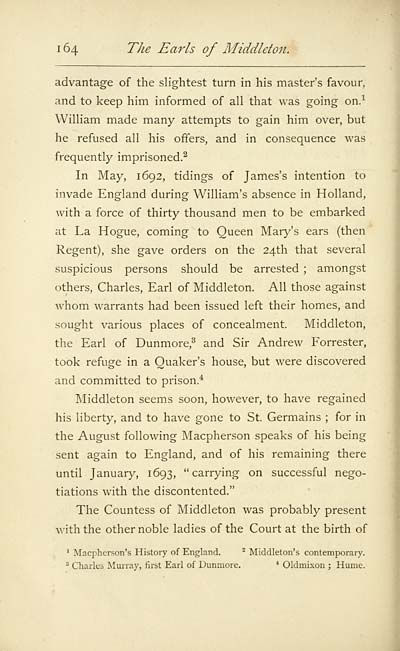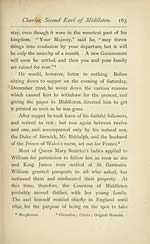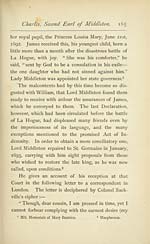Download files
Complete book:
Individual page:
Thumbnail gallery: Grid view | List view

1 64 The Em-Is of Middleton.
advantage of the slightest turn in his master's favour,
and to keep him informed of all that was going on. 1
William made many attempts to gain him over, but
he refused all his offers, and in consequence was
frequently imprisoned. 2
In May, 1692, tidings of James's intention to
invade England during William's absence in Holland,
with a force of thirty thousand men to be embarked
at La Hogue, coming to Queen Mary's ears (then
Regent), she gave orders on the 24th that several
suspicious persons should be arrested ; amongst
others, Charles, Earl of Middleton. All those against
whom warrants had been issued left their homes, and
sought various places of concealment. Middleton,
the Earl of Dunmore, 3 and Sir Andrew Forrester,
took refuge in a Quaker's house, but were discovered
and committed to prison. 4
Middleton seems soon, however, to have regained
his liberty, and to have gone to St. Germains ; for in
the August following Macpherson speaks of his being
sent again to England, and of his remaining there
until January, 1693, "carrying on successful nego-
tiations with the discontented."
The Countess of Middleton was probably present
with the other noble ladies of the Court at the birth of
1 Macpherson's History of England. 2 Middleton's contemporary.
3 Charles Murray, first Earl of Dunmore. 4 Oldmixon ; Hume.
advantage of the slightest turn in his master's favour,
and to keep him informed of all that was going on. 1
William made many attempts to gain him over, but
he refused all his offers, and in consequence was
frequently imprisoned. 2
In May, 1692, tidings of James's intention to
invade England during William's absence in Holland,
with a force of thirty thousand men to be embarked
at La Hogue, coming to Queen Mary's ears (then
Regent), she gave orders on the 24th that several
suspicious persons should be arrested ; amongst
others, Charles, Earl of Middleton. All those against
whom warrants had been issued left their homes, and
sought various places of concealment. Middleton,
the Earl of Dunmore, 3 and Sir Andrew Forrester,
took refuge in a Quaker's house, but were discovered
and committed to prison. 4
Middleton seems soon, however, to have regained
his liberty, and to have gone to St. Germains ; for in
the August following Macpherson speaks of his being
sent again to England, and of his remaining there
until January, 1693, "carrying on successful nego-
tiations with the discontented."
The Countess of Middleton was probably present
with the other noble ladies of the Court at the birth of
1 Macpherson's History of England. 2 Middleton's contemporary.
3 Charles Murray, first Earl of Dunmore. 4 Oldmixon ; Hume.
Set display mode to:
![]() Universal Viewer |
Universal Viewer | ![]() Mirador |
Large image | Transcription
Mirador |
Large image | Transcription
Images and transcriptions on this page, including medium image downloads, may be used under the Creative Commons Attribution 4.0 International Licence unless otherwise stated. ![]()
| Histories of Scottish families > Earls of Middleton, Lords of Clermont and of Fettercairn > (180) |
|---|
| Permanent URL | https://digital.nls.uk/95313139 |
|---|
| Description | A selection of almost 400 printed items relating to the history of Scottish families, mostly dating from the 19th and early 20th centuries. Includes memoirs, genealogies and clan histories, with a few produced by emigrant families. The earliest family history goes back to AD 916. |
|---|

